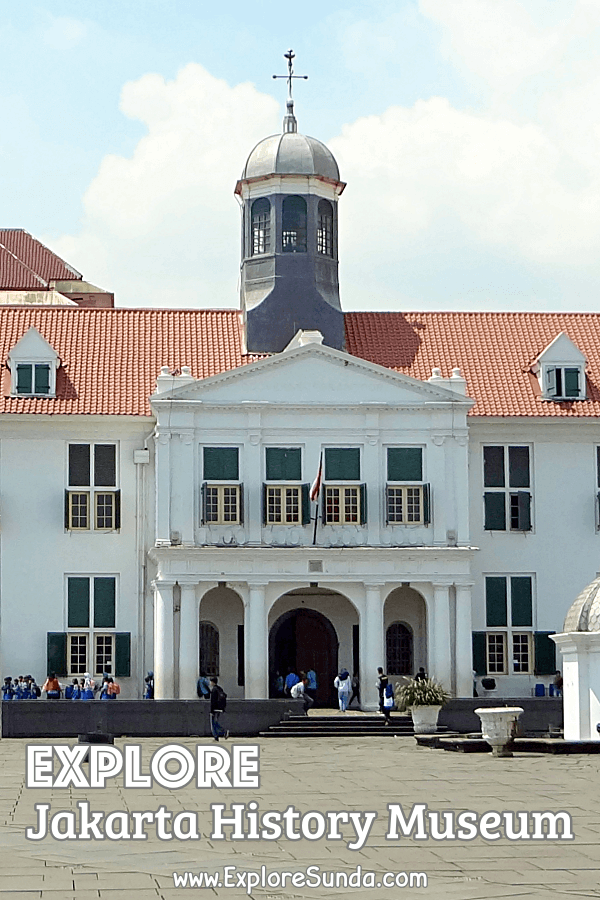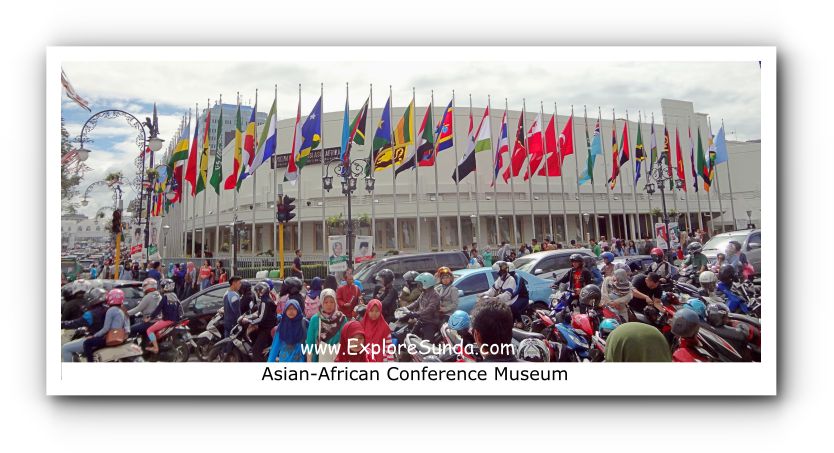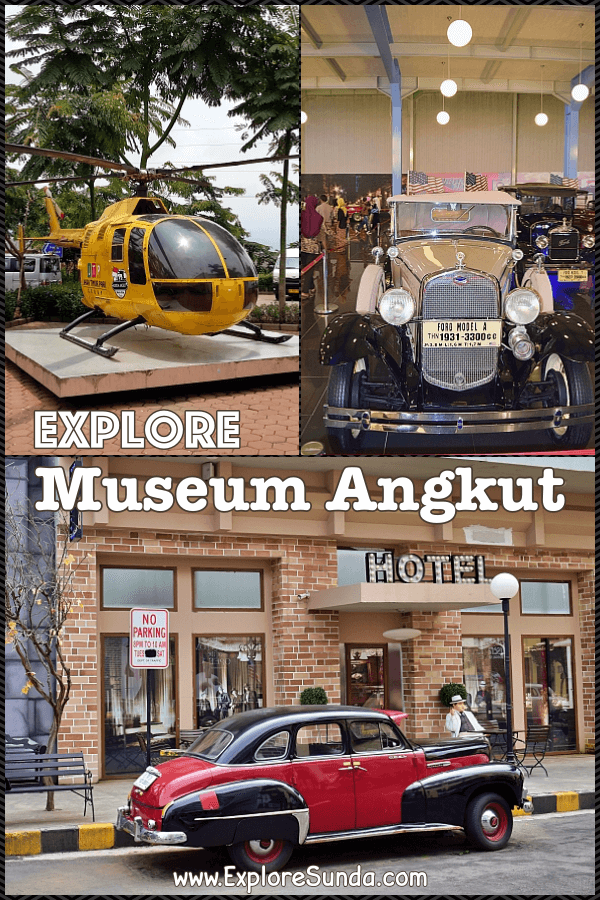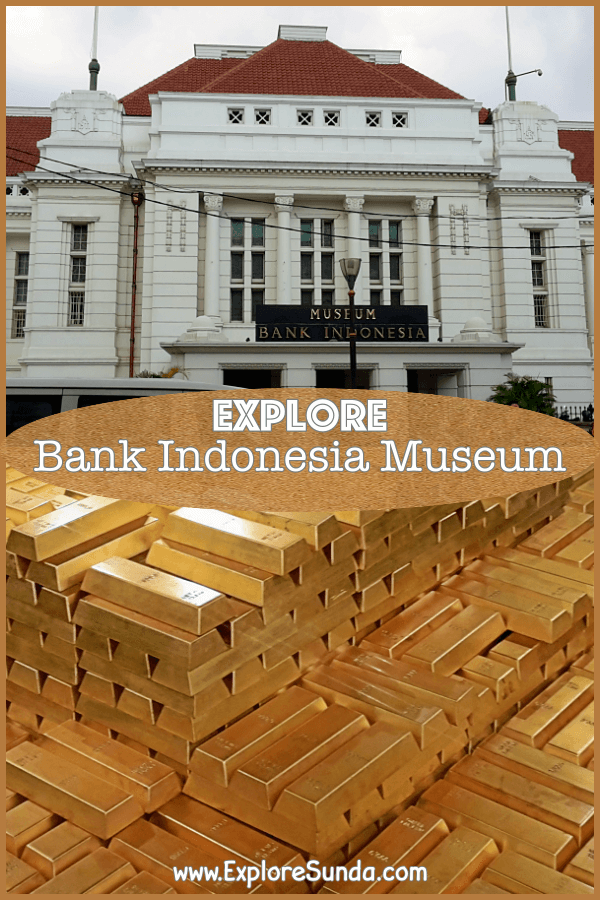- Sunda
- Famous Museums in Indonesia
- Benteng Heritage Museum
Benteng Heritage Museum
Benteng Heritage Museum is a private museum that showcases the history of Chinese Indonesians in Tangerang, also known as Cina Benteng.
The China Benteng
Before the arrival of VOC (Vereenigde Oostindische Compagnie - the Dutch trading company for the East Indies), Banten was a thriving kingdom in the western part of Java Island. Its harbor was bustling with vessels from various countries and had many vessels that sailed to different regions to trade. The vast land of Banten produced abundant rice, sugar, and pepper. When the VOC settled in Batavia, they aimed to monopolize trade and saw Banten as a rival. On the other hand, Banten, which profited from trading, absolutely opposed monopolization, leading to prolonged wars between the two.
In order to defend Batavia against the attacks from Banten, the VOC built two fortresses: Fort Sampora in Serpong and Fort Tangerang. However, locals referred to Fort Tangerang as Benteng Makassar because the VOC recruited people from Makassar (an area in Sulawesi island in eastern Indonesia) as an army there, and benteng is an Indonesian word for a fortress.
After the VOC took over Batavia (present-day Jakarta), they brought in workers from many ethnicities. During the sugar industry boom, many Chinese immigrants came to work on sugar cane plantations. They settled in the western part of Batavia, located right outside Fort Tangerang. Since then, these Chinese immigrants and their descendants became known as Cina Benteng, meaning the Chinese living near the fort.
However, they were not the first Chinese immigrants to arrive in Tangerang. The oldest manuscript that mentions the arrival of Chinese to Java island is a Sundanese manuscript called Tina Layang Parahyang (or Notes from Parahyangan, where Parahyangan refers to the land of Sunda). It recorded the arrival of the first Chinese fleet led by Chen Cie Lung (Ha Lung) in 1407. They landed at the mouth of the Cisadane River called Teluk Naga (Dragon Bay in English), and many settled down along the Cisadane River in Tangerang. Chen Cie Lung was a part of Admiral Zheng He's (Ceng Ho) fleet.
Unfortunately, the exact location of Benteng Makassar is unknown today. The last written report, dating back to 1816, stated that the fort was dilapidated beyond repair. Hence, the only indication of Benteng Makassar's whereabouts is a street on the west side of the Cisadane River named Jalan Makassar. It is in downtown Tangerang, near the Chinatown.
Although Benteng Makassar has long gone, the Chinese Indonesians in the area are still known as China Benteng. You can learn a lot about their culture and history at Benteng Heritage Museum.
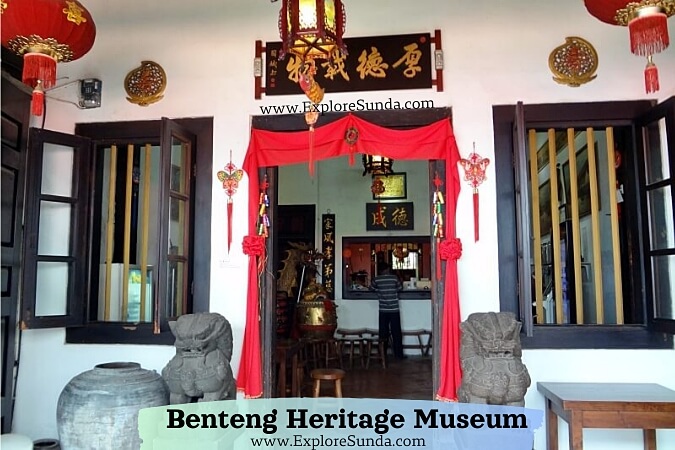 The entrance to Benteng Heritage Museum in Tangerang.
The entrance to Benteng Heritage Museum in Tangerang.A Trip to Benteng Heritage Museum
Ticket:
Rp 30,000/person
Opening Hours:
Tue-Sun,
Public Holiday
10.00-17.00
Closed on Mondays
Benteng Heritage Museum resides in a restored old Chinese house built around the 17th century. It is a typical Chinese two-story house in the heart of Tangerang downtown. What might surprise you is the location of this museum. Addressed at Jalan Cilame no. 20, Tangerang, the museum is right in the middle of a traditional market called Pasar Lama (Old Market). Every morning, tables of all sorts crowd the narrow street in front of this museum. The entrance to the museum is hidden behind vegetable sellers and butcher stands!
Since Benteng Heritage Museum uses an old house, the front room functions as a receiving area, a ticket stand, and a waiting room. The museum only offers guided tours, which are held every hour. Each takes approximately forty-five minutes. Visitors are not allowed to roam inside the museum by themselves.
Upon purchasing our ticket and filling out the guest book, we got a Benteng Heritage sticker that served as the entrance ticket.
The museum staff started her explanation in the reception area, explaining the mission of Benteng Heritage Museum to preserve the cultural heritage in Tangerang. She narrated the stories behind each portrait hanging on the wall. Some portrayed the landmarks of old Tangerang, while others depicted cultural activities.
These cultural activities are still celebrated today, especially the annual dragon boat race at the Cisadane River. In addition to the boat race, they also release ducks into the river because it is believed that good luck will be upon whoever can catch these ducks.
The dragon boat race is usually held annually on the 5th day of the 5th month of the Chinese calendar, known as Pe Cun. On that day, people eat Bacang – steamed rice filled with meat and wrapped in leaves – and Kwecang – glutinous rice wrapped in leaves. These dishes are known as rice dumplings in the Western world.
We continued our tour of Benteng Heritage Museum to the second floor, where the majority of the museum's collection was exhibited. But first, we were instructed to remove our shoes before we stepped on the stairs. We also were strictly prohibited from taking pictures or touching displays, including the railing.
During my visit to Benteng Heritage Museum, I felt like I was on a house tour. We climbed to the second floor and looked through the wooden fence, where we could see the ground floor and the attic on the third floor. The attic was adorned with solid stone relief sculptures depicting the famous Chinese story of Sam Kok, also known as the Three Kingdoms epic. This was the most precious collection in the museum.
Our tour guide led us to the balcony and showed us the entrance door that had a unique locking system. Instead of using a lock or padlock, it required a family member to remain in the house to lock it. Usually, the daughter of the family was responsible for this task.
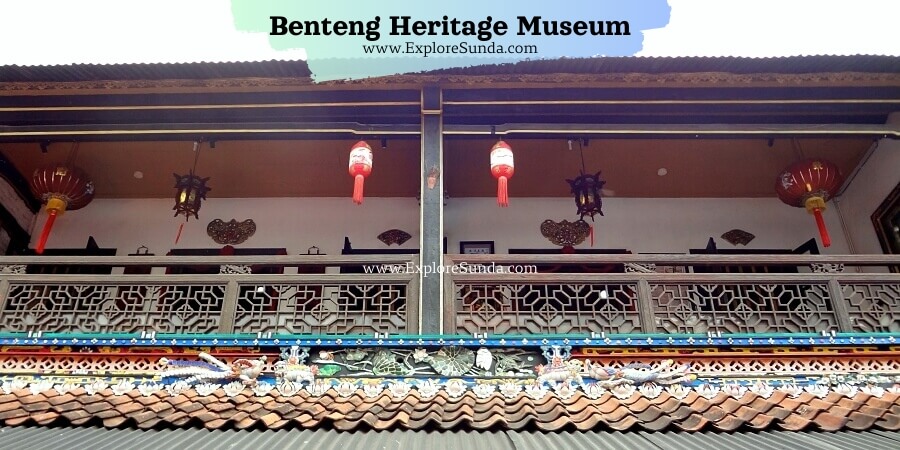 The balcony of Benteng Heritage Museum is adorned with sculptures.
The balcony of Benteng Heritage Museum is adorned with sculptures.Next was looking into the museum's extensive collection, which included a beautifully crafted wooden wedding bed with all the necessary bedroom amenities. The museum also featured a collection of tiny women's shoes worn by women in the past, as there was a belief that a woman's beauty was determined by the size of her feet. Other items on display included pipes used for smoking opium, game boards such as mahjong and dominoes, weighing scales known as da cin, antique porcelain dining wares (including the broken pieces), and an altar complete with Chinese gods.
We also saw a collection of wedding clothes. Today, some of the Cina Benteng still perform the traditional wedding ceremonies called Cio Tau, wearing this type of wedding dress.
Despite its limited space, Benteng Heritage Museum is packed with fascinating collections, making it a must-visit for anyone interested in the Cina Benteng culture and history. Plus, the tour guide provides thorough explanations.
We finished the tour at a small souvenir kiosk selling local products, including the famous SH soy bean sauce, the authentic product of Tangerang.
How To Go To Benteng Heritage Museum
Addressed at Jalan Cilame no. 20, Tangerang, the GPS coordinates to Benteng Heritage Museum are -6.178632, 106.629783. Since the museum is located in downtown Tangerang, it is easy to go there. You can opt for taxis or sharing services such as Gojek and Grab.
However, you won't be able to drive and park your car directly in front of the museum since Jalan Cilame is a narrow street swarmed with vegetable and butcher stands. You can only stop your car at the nearest street, such as Jalan Ki Samaun or Jalan Kalipasir Indah, and then continue on foot to reach the museum.
Recent Articles
-
Kawasan Wisata Punclut Bandung: Cafes & Views in Sarae Hills
Jan 28, 26 04:03 AM
Discover Punclut Bandung at Sarae Hills—cool breezes, sunset views, and cliffside cafes with photo spots, playgrounds, and diverse dining options. -
Roro Jonggrang: A Tale Etched in the Stones of Prambanan Temple
Nov 05, 25 11:52 PM
Unravel the ancient Javanese legend of Roro Jonggrang that bridges myth, devotion, and the grandeur of Prambanan. -
Discover the Vibrant Celebration of Imlek in Indonesia!
Jan 13, 25 03:24 AM
The Chinese New Year of 2576 will be celebrated on January 29, 2025. Discover the special things in this Imlek festival!
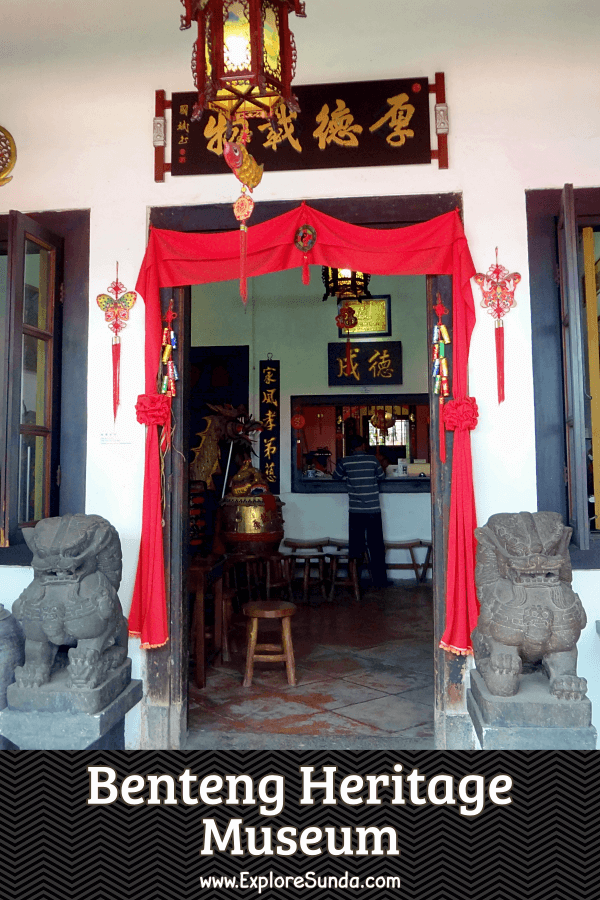
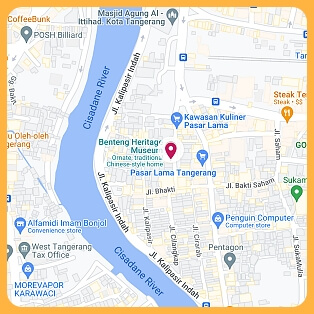
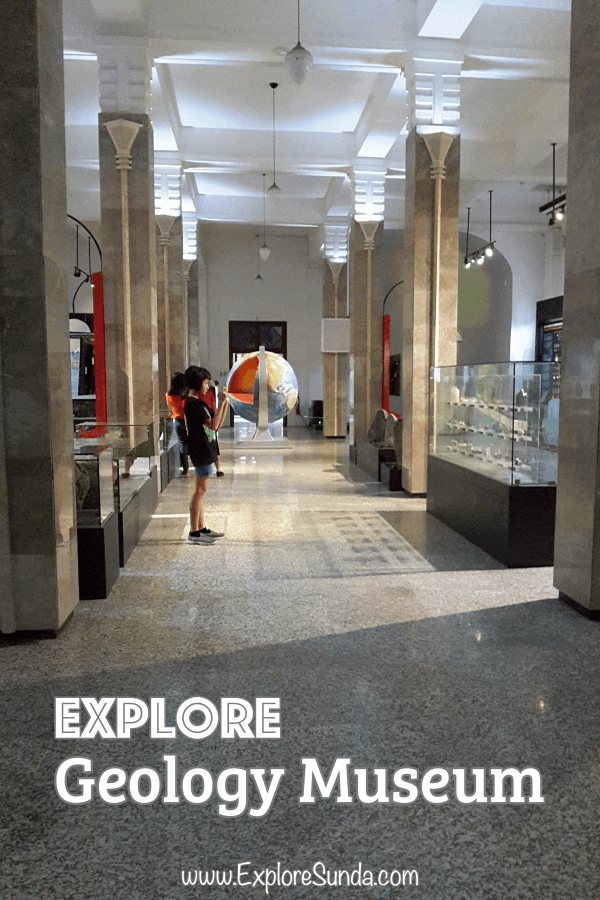
![Explore the 18 museums in Taman Mini Indonesia Indah [TMII], from fauna, cultures to science!](/images/tmii-museum-pinterest.jpg)
